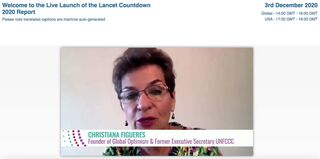Environment
Climate Change Harms Our Health
But let's remember wider influences.
Posted December 3, 2020 Reviewed by Matt Huston
The international research project Lancet Countdown, in which I am involved, tracks indicators for climate change’s impacts on health. We have just published our 2020 report detailing worrying trends for everyone. We nonetheless must be careful not to let climate change distract from other health concerns or to dominate the discussions.

Lancet Countdown’s core message this year is “No country—whether rich or poor—is immune from the health impacts of climate change.” The data from our 43 indicators “reveals the most concerning outlook for human health” since we started this project in 2016.
The concerns highlight heat extremes, problems with food, lack of freshwater, and changes to infectious disease spread. Everything is occurring with the backdrop of the COVID-19 pandemic which, for all its horrendous disruption to lives and livelihoods, has not made much of a dent in the atmosphere’s greenhouse gas concentrations, which lead to human-caused climate change.
Our Lancet Countdown report calls for substantial and urgent action to address these global concerns together, as they “represent converging crises which need to be tackled in unison.” The call to action to help everyone means that our “response to converging crises can deliver a triple win: better public health, a sustainable economy and environmental protection.”
As one of the report’s 87 authors (and many others supported us), I acknowledge the difficulties we face from climate change and COVID-19. I see people with the least opportunities to help themselves suffering the most, mainly because of the actions of others. I contributed mainly to the migration indicator, but the same baseline causes underlie many indicators, covering how we treat each other and the environment, particularly through resource allocation and consumption.
I also see the links beyond pandemics and climate change. As devastating as both are, we must never lose sight of wider and deeper contexts producing and maintaining people’s vulnerabilities.
Disaster deaths are an example. The year 2020 brought ruinous wildfires/bushfires, from Australia to the USA, along with tropical cyclones from the Philippines to the Gulf of Mexico and Caribbean Sea. There appears to be little doubt that human-caused climate change increased the strength of the fires and storms.
Similarly to the fire disasters, the storm disasters show only a tenuous link between climate change and health through mortality. When Hurricane Eta and Hurricane Iota hit Central America back-to-back in November, media and politicians attributed damage to climate change.
Yet human-caused climate change is expected to reduce hurricane numbers while increasing their intensities. Other climate variabilities seem likely to account for the high number of storms this year, although the strength of the hurricanes striking Central America probably shows a climate change signal. Irrespective, both Eta and Iota were Category 4 at landfall, so they could have been much stronger at Category 5.
The two terrible disasters related to these hurricanes, killing around 500 people in total, are hard to link to climate change. They are a disheartening repeat of many previous hurricane disasters in the region, notably Hurricane Fifi in 1974 (over 8,000 dead), Hurricane Mitch in 1998 (over 11,000 dead), and Hurricane Stan in 2005 (over 1,500 dead). All these hurricane disasters and their health impacts were caused by the chronic vulnerabilities of poverty, marginalization, and inequity, among others, not by climate change.
As always, they are not “natural disasters.” Neither the weather nor the climate nor climate change caused the disasters. No matter how hurricanes are affected by human-caused climate change, hurricane disasters would not happen if vulnerabilities would be fully tackled.
Similar conclusions emerge from the COVID-19 pandemic. Those clamoring to get the economy back on track and to get everyone back to normal need to consider that the “normal” caused the pandemic as well as climate change.
The pandemic presumably started through illegal wildlife imports and poor hygiene in dealing with the animals. Similar mechanisms likely led to many previous new infections from species-jumping microbes, including HIV, swine flu, Ebola, and two other coronaviruses (causing SARS and MERS).
For COVID-19, public health personnel swiftly identified a new disease and the virus causing it, yet authorities were slow to react. Rather than learning from the past and implementing existing pandemic plans, many governments waited until the only choice was the disease overwhelming our health systems or else crushing lockdowns.
We should not want to return to the “normal” of conditions which are ripe for a new pandemic while continuing climate change. We should not want to return to the “normal” of health systems unable to deal with daily health needs, let alone with acute crises. Instead, as our Lancet Countdown report calls for, we have a possibility of doing better.
We can especially apply the long-standing ethos from health and disasters that prevention is better than cure. We should identify, admit, and tackle the fundamental causes of pandemics and environmental destruction, which are effectively the same as the causes of the Central American hurricane disasters and the USA/Australia fire disasters.
COVID-19 and climate change are symptoms of the basic ills afflicting us. We should not be completely distracted by symptoms or let them dominate discussions and responses. Our health indicators of climate change in the context of COVID-19 should lead to redressing the chronic, debilitating, ever-present politics and societal values manufacturing and sustaining vulnerabilities.
References
Belesova, K., I. Kelman, and R. Boyd. 2016. "Governance Through Economic Paradigms: Addressing Climate Change by Accounting for Health". Politics and Governance, vol. 4, no. 4, pp. 87-96.
Kelman, I. 2017. "Linking disaster risk reduction, climate change, and the sustainable development goals". Disaster Prevention and Management, vol. 26, no. 3, pp. 254-258.
Watts, N. and 69 co-authors. 2019. "The 2019 report of The Lancet Countdown on health and climate change: ensuring that the health of a child born today is not defined by a changing climate". The Lancet, vol. 394, no. 10211, pp. 1836-1878.
Watts et al. and 86 co-authors. 2020. "The 2020 report of The Lancet Countdown on health and climate change: responding to converging crises". The Lancet, just published on 2 December 2020.




